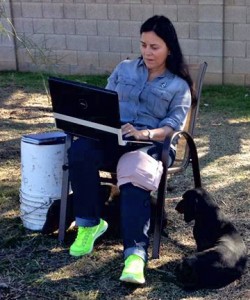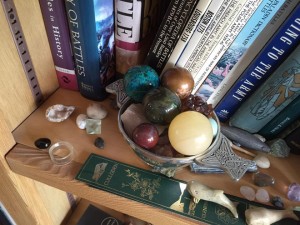 Ever wonder what I do as an author? How do I write my books? What is involved in publishing them? Below are some essays and thoughts about What I Do and about writing in general:
Ever wonder what I do as an author? How do I write my books? What is involved in publishing them? Below are some essays and thoughts about What I Do and about writing in general:
- Too many descriptions of eyes and expressions in your writing? In a short blog post on Valentine’s Day, I discussed evoking emotion and thus avoiding an excess of eyes. From February 15, 2024.
- Example of (William’s) Internals. Happy Solstice! Example of a character’s internal reactions, first posted in a discussion on The Litforum. Released on Thursday, December 21, 2023.
- Using excerpts from Book Ten of my Outlander series of novels, I discuss Dialogue (“The Three Musketeers”) and Emotion (“In the forest.”) From November, 2023.
- The question I hear often is “So…. how did you get the idea to write these books?” “My Writing Process” explores this question and other topics. How do I do the background research for my writing? Do I really write everything in a piecemeal fashion? Plus I discuss my categories of characters: onions, mushrooms, and hard nuts. (This essay includes some text from a wattled interview with Mary Rogers.)
- “Want to Watch Me Write?” is a modest example of what-all goes on my head while I’m writing, including all the thinking that happens before, during and after the writing of a single scene. It’s a preview of a longer piece I plan to release in the future. From September 13, 2016.
- “One Word Speaks Volumes (Themes of the Novels):” Some intelligent NPR interviewer asked me one day whether I could sum up the book we were talking about in a single sentence—and I realized that in fact, I could summarize the theme of each book in a single word… From March 21, 2018.
-
 The Shape of Things… All my books have an internal geometric or natural shape that emerges in the course of the work, and once I’ve seen it, the writing goes much faster. I may have no idea exactly what happens, what’s said, etc.—but I do know approximately what the missing pieces look like (e.g., I need a scene here that involves these three people, and it has a sense of rising tension and a conclusion that will lead into that scene over there…). Updated version from May 30, 2022.
The Shape of Things… All my books have an internal geometric or natural shape that emerges in the course of the work, and once I’ve seen it, the writing goes much faster. I may have no idea exactly what happens, what’s said, etc.—but I do know approximately what the missing pieces look like (e.g., I need a scene here that involves these three people, and it has a sense of rising tension and a conclusion that will lead into that scene over there…). Updated version from May 30, 2022.
- How do I create sex scenes? If you’re curious, check out I GIVE YOU MY BODY (HOW TO WRITE SEX SCENES), available as an ebook (download) from multiple vendors for your iPhone, iPad, Kindle, Nook, or computer.
Before I finished writing the ebook, I discussed this topic in a blog: “How to Write Sex Scenes.“ Blog posted in July, 2012.
- “What “Finished” Means To An Author:” As my husband often remarks, “’FINISHED’ is a relative term to a writer.” This is true! <g> I thought y’all might be interested in Just What Happens to a book after the writer is “finished” writing the manuscript and what happens after, in flow chart form. Updated version from March 29, 2021.
- What about “Endings” in writing? Using my excerpt about Raymond titled, “The Chieftains’ Tent” I discuss several types of endings: cliff-hangers, resting, or jacks. Does an ending inspire you to read more? Blog entry from April 12, 2023.
Bookshelves, Resources, and Inspiration
- “A Guided Tour of Diana’s Bookshelves:” I get a lot of questions about what I read, what resources I find “useful,” how much research I do, etc., etc. And when interviewers come to talk to me at home, they always want to see my office, and frequently spend half an hour or more browsing my bookshelves in fascination. So I thought y’all might want to have a peek, too.From July 8, 2012.
- “Inspiration and Bookshelves” further discusses what “inspired” this or that element/incident/character in my books, and how the items on my office bookshelves help as aids for thought. With more photos of my bookshelves from September, 2015.
- “A Brief Footnote on Tidiness” addresses comments from readers about the tidiness of my bookshelves and the resources they house, and further discusses my writing resources and habits. From July 12, 2012.
How To Write – Tips For Aspiring Authors
Some readers send emails asking if I can help teach them to write. Sorry, but no, I can’t.
Or they may ask if they can send me their story idea I can write it up. Again, no, thanks; I have plenty of my own ideas to explore.
If you’re one of those readers… you need to write up your own ideas! <g>
Writing is an active skill; the only way to learn is to do it, to actually sit down and write every day.
Learning to write takes a lot of work, and here are a few tips:
-
A good method for a new author is to set a goal of creating at least a page or two of new writing daily. (A “page” for writers is about 250 words, or the text that fits double-spaced onto a typical 8.5 by 10 inch page. Your word processor program will count words for you, or just eyeball it!) Get into the habit of writing. First drafts won’t be perfect, just get your ideas into your computer’s word processor.
At the end of a year, if you are writing a novel and have produced at least a page per day, you will have at least 365 pages. That is an average-sized novel!
- Once you have some pages and words that you have written after a few months, the next step is to learn to edit your work, to perfect it. Again, this is something that takes practice and doing.
- To learn about editing, creating characters, plots, doing background research, etc., many new authors decide to enroll in a creative writing course in a local junior college or college. Or join a local writer’s group. There are also writing workshops held around the country for aspiring authors which feature published authors who read the work of new writers and offer edits and suggestions. Classes or workshops can help teach you how to research, plan, and edit your work.
- But again, the only way to learn to write is to sit down every day and do it. And keep doing it!
- Some authors write using an outline. I don’t—doesn’t work for me. You should try whatever method helps and makes sense to you, to outline or not. This is a good time to mention that you need to decide for yourself which tips and methods are right for you.
- Find your own style, your own voice. Trying to copy the writing styles of others is usually not productive. You can study published writers and learn from them, though.
-
It’s a good idea to learn how to write in standard manuscript format for novels and short stories as you write, to save time in getting ready to submit your work to publishers. Here is one example of a guide to manuscript format:
https://www.scribophile.com/academy/how-to-format-a-novel-manuscript
- And again, check out my ebook, I GIVE YOU MY BODY (HOW TO WRITE SEX SCENES), available as an ebook (download) from multiple vendors for your iPhone, iPad, Kindle, Nook, or computer. Or check out my blog discussion: “How to Write Sex Scenes.”
Good luck with your writing!
-Diana
The image at top shows me at work outside in my back yard, with my dogs, Homer and JJ. The lower image is of a section of my bookshelves in my office.
This page was last updated on Wednesday, February 28, 2024 at 2:45 a.m. (Central Time) by Diana or Diana’s Webmistress.
